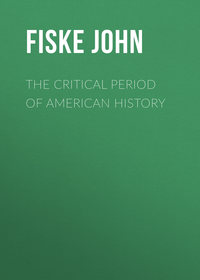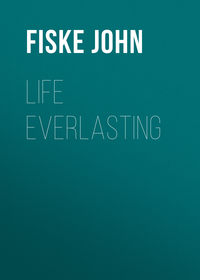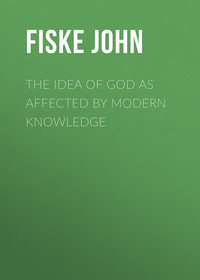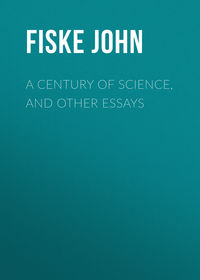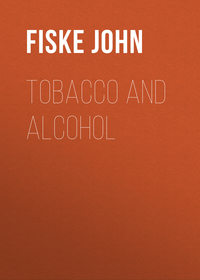 полная версия
полная версияThrough Nature to God
IV
The Dramatic Unity of Nature
Now in these strong assertions it seems to me that the Calvinist is much more nearly in accord with our modern knowledge than are Plato and Mill. It is not wise to hazard statements as to what the future may bring forth, but I do not see how the dualism implied in all these attempts to refer good and evil to different creative sources can ever be seriously maintained again. The advance of modern science carries us irresistibly to what some German philosophers call monism, but I prefer to call it monotheism. In getting rid of the Devil and regarding the universe as the multiform manifestation of a single all-pervading Deity, we become for the first time pure and uncompromising monotheists, – believers in the ever-living, unchangeable, and all-wise Heavenly Father, in whom we may declare our trust without the faintest trace of mental reservation.
If we can truly take such a position, and hold it rationally, it is the modern science so apt to be decried by the bats and owls of orthodoxy that justifies us in doing so. For what is the philosophic purport of these beautiful and sublime discoveries with which the keen insight and patient diligence of modern students of science are beginning to be rewarded? What is the lesson that is taught alike by the correlation of forces, by spectrum analysis, by the revelations of chemistry as to the subtle behaviour of molecules inaccessible to the eye of sense, by the astronomy that is beginning to sketch the physical history of countless suns in the firmament, by the palæontology which is slowly unravelling the wonders of past life upon the earth through millions of ages? What is the grand lesson that is taught by all this? It is the lesson of the unity of nature. To learn it rightly is to learn that all the things that we can see and know, in the course of our life in this world, are so intimately woven together that nothing could be left out without reducing the whole marvellous scheme to chaos. Whatever else may be true, the conviction is brought home to us that in all this endless multifariousness there is one single principle at work, that all is tending toward an end that was involved from the very beginning, if one can speak of beginnings and ends where the process is eternal. The whole universe is animated by a single principle of life, and whatever we see in it, whether to our half-trained understanding and narrow experience it may seem to be good or bad, is an indispensable part of the stupendous scheme. As Aristotle said, so long ago, in one of those characteristic flashes of insight into the heart of things in which no one has ever excelled him, in nature there is nothing that is out of place or interpolated, as in an ill-constructed drama.
To-day we can begin to realize how much was implied in this prophetic hint of Aristotle's, for we are forced to admit that whatever may be the function of evil in this world, it is unquestionably an indispensable function, and not something interpolated from without. Whatever exists is part of the dramatic whole, and this can quickly be proved. The goodness in the world – all that we love and praise and emulate – we are ready enough to admit into our scheme of things, and to rest upon it our belief in God. The misery, the pain, the wickedness, we would fain leave out. But if there were no such thing as evil, how could there be such a thing as goodness? Or to put it somewhat differently, if we had never known anything but goodness, how could we ever distinguish it from evil? How could we recognize it as good? How would its quality of goodness in any wise interest or concern us? This question goes down to the bottom of things, for it appeals to the fundamental conditions according to which conscious intelligence exists at all. Its answer will therefore be likely to help us. It will not enable us to solve the problem of evil, enshrouded as it is in a mystery impenetrable by finite intelligence, but it will help us to state the problem correctly; and surely this is no small help. In the mere work of purifying our intellectual vision there is that which heals and soothes us. To learn to see things without distortion is to prepare one's self for taking the world in the right mood, and in this we find strength and consolation.
V
What Conscious Life is made of
To return to our question, how could we have good without evil, we must pause for a moment and inquire into the constitution of the human mind. What we call the soul, the mind, the conscious self, is something strange and wonderful. In our ordinary efforts to conceive it, invisible and impalpable as it is, we are apt to try so strenuously to divorce it from the notion of substance that it seems ethereal, unreal, ghostlike. Yet of all realities the soul is the most solid, sound, and undeniable. Thoughts and feelings are the fundamental facts from which there is no escaping. Our whole universe, from the sands on the seashore to the flaming suns that throng the Milky Way, is built up of sights and sounds, of tastes and odours, of pleasures and pains, of sensations of motion and resistance either felt directly or inferred. This is no ghostly universe, but all intensely real as it exists in that intensest of realities, the human soul! Consciousness, the soul's fundamental fact, is the most fundamental of facts. But a truly marvellous affair is consciousness! The most general truth that we can assert with regard to it is this, that it exists only by virtue of incessant change. A state of consciousness that should continue through an appreciable interval of time without undergoing change would not be a state of consciousness. It would be unconsciousness.
This perpetual change, then, is what makes conscious life. It is only by virtue of this endless procession of fleeting phases of consciousness that the human soul exists at all. It is thus that we are made. Why we should have been made thus is a question aiming so far beyond our ken that it is idle to ask it. We might as well inquire whether Infinite Power could have made twice two equal five. We must rest content with knowing that it is thus we were created; it is thus that the human soul exists. Just as dynamic astronomy rests upon the law of gravitation, just as physics is based upon the properties of waves, so the modern science of mind has been built upon the fundamental truth that consciousness exists only by virtue of unceasing change. Our conscious life is a stream of varying psychical states which quickly follow one another in a perpetual shimmer, with never an instant of rest. The elementary psychical states, indeed, lie below consciousness, or, as we say, they are sub-conscious. We may call these primitive pulsations the psychical molecules out of which are compounded the feelings and thoughts that well up into the full stream of consciousness. Just as in chemistry we explain the qualitative differences among things as due to diversities of arrangement among compounded molecules and atoms, so in psychology we have come to see that thoughts and feelings in all their endless variety are diversely compounded of sub-conscious psychical molecules.
Musical sounds furnish us with a simple and familiar illustration of this. When the sounds of taps or blows impinge upon the ear slowly, at the rate of not more than sixteen in a second, they are cognized as separate and non-musical noises. When they pass beyond that rate of speed, they are cognized as a continuous musical tone of very low pitch; a state of consciousness which seems simple, but which we now see is really compound. As the speed of the blows increases, further qualitative differences arise; the musical tone rises in pitch until it becomes too acute for the ear to cognize, and thus vanishes from consciousness. But this is far from being the whole story; for the series of blows or pulsations make not only a single vivid fundamental tone, but also a multifarious companion group of fainter overtones, and the diverse blending of these faint harmonics constitutes the whole difference in tone quality between the piano and the flute, the violin and the trumpet, or any other instruments. If you take up a violin and sound the F one octave above the treble staff, there are produced, in the course of a single second, several thousand psychical states which together make up the sensation of pitch, fifty-five times as many psychical states which together make up the sensation of tone quality, and an immense number of other psychical states which together make up the sensation of intensity. These psychical states are not, in any strict sense of the term, states of consciousness; for if they were to rise individually into consciousness, the result would be an immense multitude of sensations, and not a single apparently homogeneous sensation. There is no alternative but to conclude that in this case a seemingly simple state of consciousness is in reality compounded of an immense multitude of sub-conscious psychical changes.
Now, what is thus true in the case of musical sounds is equally true of all states of consciousness whatever, both those that we call intellectual and those that we call emotional. All are highly compounded aggregates of innumerable minute sub-conscious psychical pulsations, if we may so call them. In every stream of human consciousness that we call a soul each second of time witnesses thousands of infinitely small changes, in which one fleeting group of pulsations in the primordial mind-stuff gives place to another and a different but equally fleeting group. Each group is unlike its immediate predecessor. The absence of difference would be continuance, and continuance means stagnation, blankness, negation, death. That ceaseless flutter, in which the quintescence of conscious life consists, is kept up by the perpetual introduction of the relations of likeness and unlikeness. Each one of the infinitesimal changes is a little act of discrimination, a recognition of a unit of feeling as either like or unlike some other unit of feeling. So in these depths of the soul's life the arrangements and re-arrangements of units go on, while on the surface the results appear from moment to moment in sensations keen or dull, in perceptions clear or vague, in judgments wise or foolish, in memories gay or sad, in sordid or lofty trains of thought, in gusts of anger or thrills of love. The whole fabric of human thought and human emotion is built up out of minute sub-conscious discriminations of likenesses and unlikenesses, just as much as the material world in all its beauty is built up out of undulations among invisible molecules.
VI
Without the Element of Antagonism there could be no Consciousness, and therefore no World
We may now come up out of these depths, accessible only to the plummet of psychologic analysis, and move with somewhat freer gait in the region of common and familiar experiences. It is an undeniable fact that we cannot know anything whatever except as contrasted with something else. The contrast may be bold and sharp, or it may dwindle into a slight discrimination, but it must be there. If the figures on your canvas are indistinguishable from the background, there is surely no picture to be seen. Some element of unlikeness, some germ of antagonism, some chance for discrimination, is essential to every act of knowing. I might have illustrated this point concretely without all the foregoing explanation, but I have aimed at paying it the respect due to its vast importance. I have wished to show how the fact that we cannot know anything whatever except as contrasted with something else is a fact that is deeply rooted in the innermost structure of the human mind. It is not a superficial but a fundamental truth, that if there were no colour but red it would be exactly the same thing as if there were no colour at all. In a world of unqualified redness, our state of mind with regard to colour would be precisely like our state of mind in the present world with regard to the pressure of the atmosphere if we were always to stay in one place. We are always bearing up against the burden of this deep aerial ocean, nearly fifteen pounds upon every square inch of our bodies; but until we can get a chance to discriminate, as by climbing a mountain, we are quite unconscious of this heavy pressure. In the same way, if we knew but one colour we should know no colour. If our ears were to be filled with one monotonous roar of Niagara, unbroken by alien sounds, the effect upon consciousness would be absolute silence. If our palates had never come in contact with any tasteful thing save sugar, we should know no more of sweetness than of bitterness. If we had never felt physical pain, we could not recognize physical pleasure. For want of the contrasted background its pleasurableness would be non-existent. And in just the same way it follows that without knowing that which is morally evil we could not possibly recognize that which is morally good. Of these antagonist correlatives, the one is unthinkable in the absence of the other. In a sinless and painless world, human conduct might possess more outward marks of perfection than any saint ever dreamed of; but the moral element would be lacking; the goodness would have no more significance in our conscious life than that load of atmosphere which we are always carrying about with us.
We are thus brought to a striking conclusion, the essential soundness of which cannot be gainsaid. In a happy world there must be sorrow and pain, and in a moral world the knowledge of evil is indispensable. The stern necessity for this has been proved to inhere in the innermost constitution of the human soul. It is part and parcel of the universe. To him who is disposed to cavil at the world which God has in such wise created, we may fairly put the question whether the prospect of escape from its ills would ever induce him to put off this human consciousness, and accept in exchange some form of existence unknown and inconceivable! The alternative is clear: on the one hand a world with sin and suffering, on the other hand an unthinkable world in which conscious life does not involve contrast.
The profound truth of Aristotle's remark is thus more forcibly than ever brought home to us. We do not find that evil has been interpolated into the universe from without; we find that, on the contrary, it is an indispensable part of the dramatic whole. God is the creator of evil, and from the eternal scheme of things diabolism is forever excluded. Ormuzd and Ahriman have had their day and perished, along with the doctrine of special creations and other fancies of the untutored human mind. From our present standpoint we may fairly ask, What would have been the worth of that primitive innocence portrayed in the myth of the garden of Eden, had it ever been realized in the life of men? What would have been the moral value or significance of a race of human beings ignorant of sin, and doing beneficent acts with no more consciousness or volition than the deftly contrived machine that picks up raw material at one end, and turns out some finished product at the other? Clearly, for strong and resolute men and women an Eden would be but a fool's paradise. How could anything fit to be called character have ever been produced there? But for tasting the forbidden fruit, in what respect could man have become a being of higher order than the beasts of the field? An interesting question is this, for it leads us to consider the genesis of the idea of moral evil in man.
VII
A Word of Caution
Before we enter upon this topic a word of caution may be needed. I do not wish the purpose of the foregoing questions to be misunderstood. The serial nature of human thinking and speaking makes it impossible to express one's thought on any great subject in a solid block; one must needs give it forth in consecutive fragments, so that parts of it run the risk of being lost upon the reader or hearer, while other parts are made to assume undue proportions. Moreover, there are many minds that habitually catch at the fragments of a thought, and never seize it in the block; and in such manner do strange misconceptions arise. I never could have dreamed, until taught by droll experience, that the foregoing allusions to the garden of Eden could be understood as a glorification of sin, and an invitation to my fellow-men to come forth with me and be wicked! But even so it was, on one occasion when I was trying, somewhat more scantily than here, to state the present case. In the midst of my endeavour to justify the grand spirit of faith which our fathers showed when from abysmal depths of affliction they never failed to cry that God doeth all things well, I was suddenly interrupted with queries as to just what percentage of sin and crime I regarded as needful for the moral equilibrium of the universe; how much did I propose to commit myself, how much would I advise people in general to commit, and just where would I have them stop! Others deemed it necessary to remind me that there is already too much suffering in the world, and we ought not to seek to increase it; that the difference between right and wrong is of great practical importance; and that if we try to treat evil as good we shall make good no better than evil.
When one has sufficiently recovered one's gravity, it is permissible to reply to such criticisms that the sharp antithesis between good and evil is essential to every step of my argument, which would entirely collapse if the antagonism were for one moment disregarded. The quantity of suffering in the world is unquestionably so great as to prompt us to do all in our power to diminish it; such we shall presently see must be the case in a world that proceeds through stages of evolution. When one reverently assumes that it was through some all-wise and holy purpose that sin was permitted to come into the world, it ought to be quite superfluous to add that the fulfilment of any such purpose demands that sin be not cherished, but suppressed. If one seeks, as a philosopher, to explain and justify God's wholesale use of death in the general economy of the universe, is one forsooth to be charged with praising murder as a fine art and with seeking to found a society of Thugs?
VIII
The Hermit and the Angel
The simple-hearted monks of the Middle Ages understood, in their own quaint way, that God's methods of governing this universe are not always fit to be imitated by his finite creatures. In one of the old stories that furnished entertainment and instruction for the cloister it is said that a hermit and an angel once journeyed together. The angel was in human form and garb, but had told his companion the secret of his exalted rank and nature. Coming at nightfall to a humble house by the wayside, the two travellers craved shelter for the love of God. A dainty supper and a soft, warm bed were given them, and in the middle of the night the angel arose and strangled the kind host's infant son, who was quietly sleeping in his cradle. The good hermit was paralyzed with amazement and horror, but dared not speak a word. The next night the two comrades were entertained at a fine mansion in the city, where the angel stole the superb golden cup from which his host had quaffed wine at dinner. Next day, while crossing the bridge over a deep and rapid stream, a pilgrim met the travellers. "Canst thou show us, good father," said the angel, "the way to the next town?" As the pilgrim turned to point it out, this terrible being caught him by the shoulder and flung him into the river to drown. "Verily," thought the poor hermit, "it is a devil that I have here with me, and all his works are evil;" but fear held his tongue, and the twain fared on their way till the sun had set and snow began to fall, and the howling of wolves was heard in the forest hard by. Presently the bright light coming from a cheerful window gave hope of a welcome refuge; but the surly master of the house turned the travellers away from his door with curses and foul gibes. "Yonder is my pig-sty for dirty vagrants like you." So they passed that night among the swine; and in the morning the angel went to the house and thanked the master for his hospitality, and gave him for a keepsake (thrifty angel!) the stolen goblet. Then did the hermit's wrath and disgust overcome his fears, and he loudly upbraided his companion. "Get thee gone, wretched spirit!" he cried. "I will have no more of thee. Thou pretendest to be a messenger from heaven, yet thou requitest good with evil, and evil with good!" Then did the angel look upon him with infinite compassion in his eyes. "Listen," said he, "short-sighted mortal. The birth of that infant son had made the father covetous, breaking God's commandments in order to heap up treasures which the boy, if he had lived, would have wasted in idle debauchery. By my act, which seemed so cruel, I saved both parent and child. The owner of the goblet had once been abstemious, but was fast becoming a sot; the loss of his cup has set him to thinking, and he will mend his ways. The poor pilgrim, unknown to himself, was about to commit a mortal sin, when I interfered and sent his unsullied soul to heaven. As for the wretch who drove God's children from his door, he is, indeed, pleased for the moment with the bauble I left in his hands; but hereafter he will burn in hell." So spoke the angel; and when he had heard these words the hermit bowed his venerable head and murmured, "Forgive me, Lord, that in my ignorance I misjudged thee."
I suspect that, with all our boasted science, there is still much wisdom for us in the humble childlike piety of the Gesta Romanorum. To say that the ways of Providence are inscrutable is still something more than an idle platitude, and there still is room for the belief that, could we raise the veil that enshrouds eternal truth, we should see that behind nature's cruelest works there are secret springs of divinest tenderness and love. In this trustful mood we may now return to the question as to the genesis of the idea of moral evil, and its close connection with man's rise from a state of primeval innocence.
IX
Man's Rise from the Innocence of Brutehood
We have first to note that in various ways the action of natural selection has been profoundly modified in the course of the development of mankind from a race of inferior creatures. One of the chief factors in the production of man was the change that occurred in the direction of the working of natural selection, whereby in the line of man's direct ancestry the variations in intelligence came to be seized upon, cherished, and enhanced, to the comparative neglect of variations in bodily structure. The physical differences between man and ape are less important than the physical differences between African and South American apes. The latter belong to different zoölogical families, but the former do not. Zoölogically, man is simply one genus in the old-world family of apes. Psychologically, he has travelled so far from apes that the distance is scarcely measurable. This transcendent contrast is primarily due to the change in the direction of the working of natural selection. The consequences of this change were numerous and far-reaching. One consequence was that gradual lengthening of the plastic period of infancy which enabled man to became a progressive creature, and organized the primeval semi-human horde into definite family groups. I have elsewhere expounded this point, and it is known as my own especial contribution to the theory of evolution.
Another associated consequence, which here more closely concerns us, was the partial stoppage of the process of natural selection in remedying unfitness. A quotation from Herbert Spencer will help us to understand this partial stoppage: "As fast as the faculties are multiplied, so fast does it become possible for the several members of a species to have various kinds of superiorities over one another. While one saves its life by higher speed, another does the like by clearer vision, another by keener scent, another by quicker hearing, another by greater strength, another by unusual power of enduring cold or hunger, another by special sagacity, another by special timidity, another by special courage… Now … each of these attributes, giving its possessor an extra chance of life, is likely to be transmitted to posterity. But" it is not nearly so likely to be increased by natural selection. For "if those members of the species which have but ordinary" or even deficient shares of some valuable attribute "nevertheless survive by virtue of other superiorities which they severally possess, then it is not easy to see how this particular attribute can be" enhanced in subsequent generations by natural selection.2


